Ruthi Postow Birch's Blog, page 10
November 1, 2019
How the Animals Tricked the Farmer: A Barnyard Tale
It was Friday afternoon, and the children slogged miserably home through the baseball-game-spoiling rain.
“Rain! Rain! It ruins everything,” grumbled the boy, as they climbed the porch steps to where Uncle Gus sat on the swing. “It’s gonna be a terrible weekend!”
When their uncle said, “We’ve needed a good rain,” the girl made a face and said, “We didn’t need it on the weekend.” She wrung water from her bobbed hair, then twirled around, shooting streams of water off her sopping wet skirt.
Uncle Gus held up a hand to block the spray, and scolded, “Stop that. I don’t need to get wet to know it’s raining. You children are soaked to the skin. Go in and get into dry clothes. If you come back in a good humor, I just might tell you a story about the time a chicken, a peacock & a goat tricked Farmer Crenshaw.”
In minutes the children were in dry clothes, and curled up beside Uncle Gus on the sofa.
“This story starts on a day a lot like today,” he said. “But it was worse. It was the thirteenth day of the rainingest, thunderingest, lighteningest weather the animals could remember. They were touchy, spiteful, and downright ornery.

Blue Tommie Joe, the proud blue rooster, refused to crow – being that he was as sulky as some children I know. (He cleared his throat and looked at the girl.)
Pearl, the generally even-tempered, no-nonsense duck, was snapping at everybody. She even snapped at Rocko, the scary cat that lived under Farmer Crenshaw’s porch, and Rocko took it because he was a little afraid of Pearl. Everybody else was afraid of him, even the wily gander Hank, a gambler who always kept his bodyguard turkeys nearby.
Even Sundara, the peacock, who was irksomely cheerful, according to Blue, had his tail dragging a little. Sundara’s sunny disposition made him the most beloved animal on the farm. He tried to cheer up Blue, saying, “Storms always end in rainbows.” Blue walked away.
Then, the very next morning, the storm broke. The animals poked their noses out of barns, coops, and sties, saw sunshine, and ran out rejoicing. Rams loped across the pasture and leaped over rocks. Pigs rolled in the nice fresh mud. Sundara spread his beautiful tail to dry, smiled, and said, “See. I told you. The rain makes sunshine brighter. Blue rolled his eyes and flew to the fence where he crowed.
When they gathered in the barnyard for supper, Pearl said, “We’ve all been contrary as snakes. The rain’s over now, so we need to do something fun together.”

Esmeralda, the motherly cow, said. “What about a talent show? That would be fun.”
“That’s a fine idea,” said Pearl. “A talent show.”
Sundara broke into a jig. “I can do a dance.”
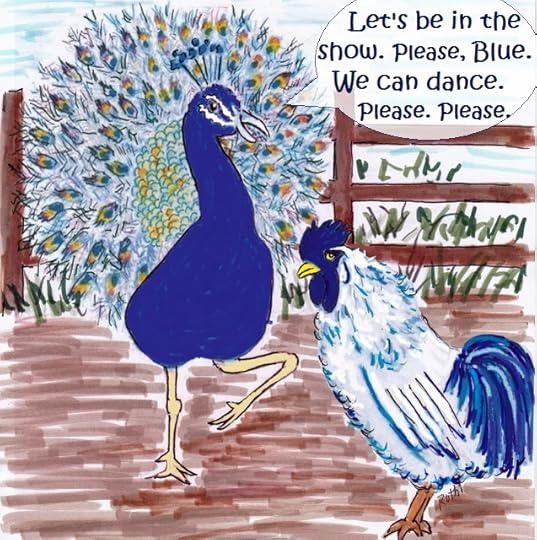
The barnyard crackled with excitement as they made plans for the show.
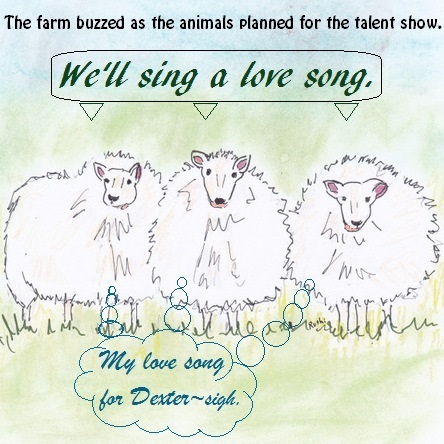
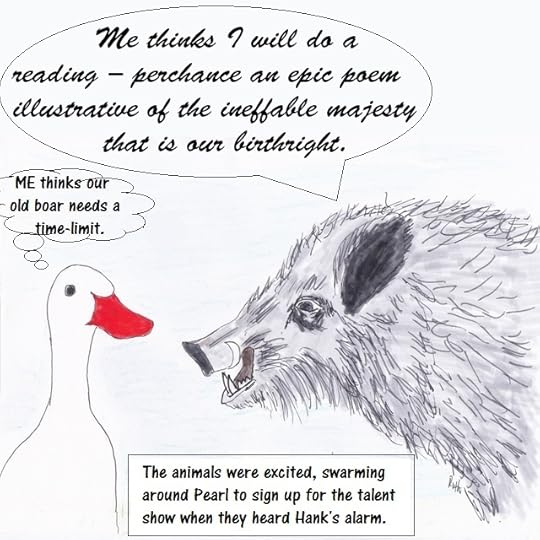
But then, all of a sudden, the fun stopped because they heard a terrible sound. Hank was running toward them, honking the alarm.
The chickens ran in circles, screaming, “Oh, no! The alarm. It’s bad. It’s bad.”
Esmeralda said. “Hens, be still! What is it, Hank?”

“It’s bad – real bad,” he said, leaning over, holding his sides, and gasping for breath. “It’s Sundara!” he cried. “Farmer Crenshaw is selling Sundara! I was up by the farmhouse and heard him say so.”
The barnyard was quiet as midnight for a minute. That peacock was the one thing every last animal agreed on. They loved him – even Blue, though he’d never admit it. Then pandemonium broke out, with cries of, “No! No! Not Sunny! No! He can’t.”
“Times are tough,” is what Farmer Crenshaw said, and he can’t afford an animal, “that’s just for pretty. Animals have to earn their keep, and all Sunny does is look pretty and eat.”
The blue peacock turned almost white and had tears in his eyes.
Pearl put her wing around him. “Sundara does more than that,” she said, but she couldn’t think of what.
Blue flew up in a frenzy and stuck out his talons, crowing, “I’ll fight him.”
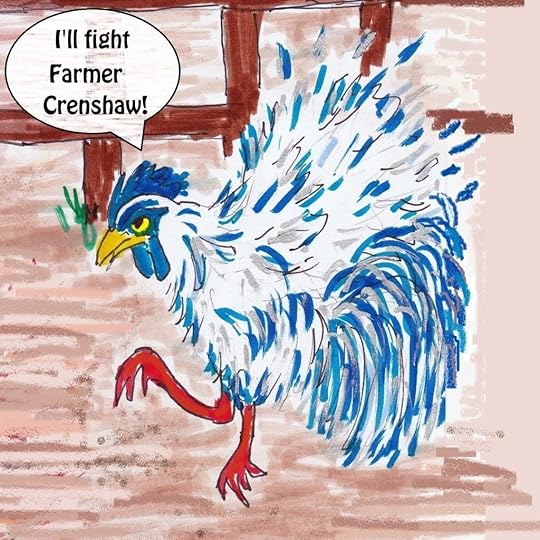
“You’re not fighting Farmer Crenshaw,” scoffed Hank. “What we need to do is show him Sunny is valuable, too valuable to sell.”
Hank’s protection turkeys, Mick and Mack, looked at each other and said, “A guard for the farm is valuable.”
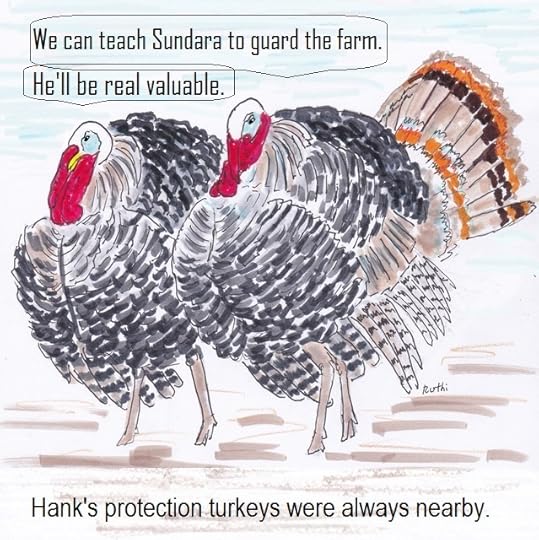
Mack said, “Sundara can do that. He has a fierce cry, fierce enough to scare the dead. And look at those long legs. They can kick.”
“Guard from what?” asked Pearl.
“Uh… a bear,” said Mick.
“No bear’s been seen here since I was an egg.”
Mack said, “We don’t need a real bear. We just need Farmer Crenshaw to think there’s one.” He looked at Dexter, the ram, and said, “You clump about like a bear, and your snort is almost a growl. If we tied some old blankets around you and covered your horns, you could pass for a bear.”
“Yes,” said Mick. “We can put on a show and trick the farmer. Sunny will cry and wake up the house. They’ll come out to see the bear chasing his animals. Then Sunny will shriek, and kick, and chase the bear into the woods.”
“It’s a better idea than Blue fighting Farmer Crenshaw,” said Hank.
The turkeys went to work, training Sundara. But the sweet bird’s kicks were timid. “No. No,” yelled Mick. “That wouldn’t scare a butterfly. Kick me!”
Mack called Blue over. “Sunny, here’s Blue. I’m a real bear, and I’m attacking him. Show us what you’d do.”
Mack charged at Blue, and Sundara stopped him with a kick so hard he tumbled to the ground. Sundara ran to him, crying, “I’m sorry.”
He sat up, grinning. “Sunny, don’t be sorry. You’ve just become valuable. Now we can show Farmer Crenshaw he needs you.”
That very night, when the moon was up, the turkeys crept to the woods near the farmhouse with Sundara, Goldie, Blue, and Dexter, who looked every bit the bear.
“All right, Dexter get ready to growl and attack. Goldie and Blue, you stand here, ready to run. Sunny, cry out to wake the farmer.” He did and the light went on in the house. “Now, Goldie and Blue, take off running past the porch, and make a ruckus like you’re scared for your lives. Dexter growl and chase them. Okay, Sunny, go after Dexter, kicking and shrieking.”
Farmer and Mrs. Crenshaw ran out as the animals put on the finest show ever seen on any farm. But there was one thing the turkeys hadn’t thought of – Farmer Crenshaw’s shotgun. He fired and just missed Dexter, raised it again and took aim.
The little play was about to come to a sad, sad end. But Rocko saved the day. Just as Farmer Crenshaw was pulling the trigger, Rocko yowled, jumped up, and clung to his arm. The bullet went wild.
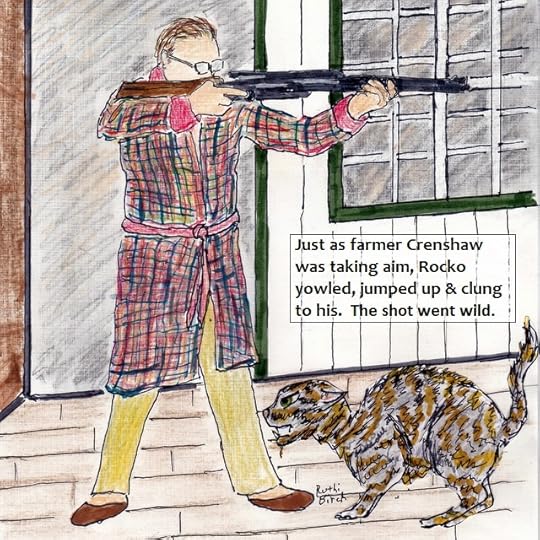
The farmer shook Rocko to the floor. Then he saw Sundara kicking chasing the bear away, saving his chickens.
Dexter ran back to the barnyard through the woods, where he shed his blankets. The chickens rushed to follow Sundara back to the barnyard.
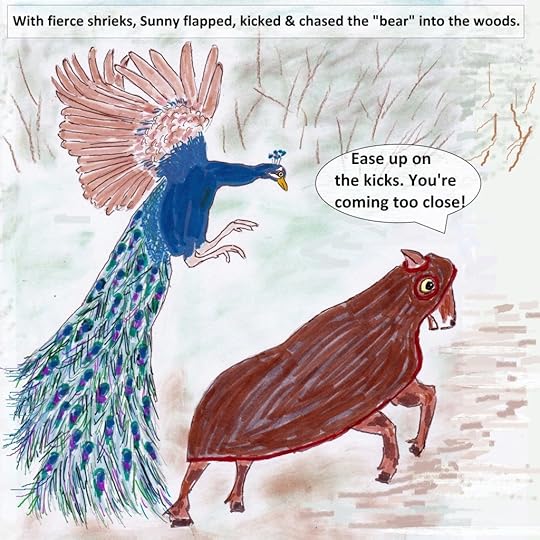
Hank hung back in the shadows to listen. Mrs. Crenshaw said, “Did you see that? The peacock ran off a bear! The farmer shook his head, “And to think I was about to sell him.”
Hank ran to the animals, yelling, “It worked. Sunny stays!”
They high-fived each other, and cheered for the turkeys who blushed because attack turkeys are accustomed to praise.
And that’s how the animals tricked Farmer Crenshaw into seeing Sundara was more than pretty feathers. The end!
“Wait,” said the girl. “What about the talent show?”
“Oh, that. It was a grand show. The end.”
“No. Tell us about it.”
“That’s another story for another time.” Uncle Gus looked at his watch. “Whew! It’s late. I need my beauty sleep. You can’t stay as pretty as I am your without beauty sleep. Bessie, you ready?”
“It would be awful bad if Gus lost his pretty,” said Aunt Bessie, laughing. “Let’s all go to bed. If you get up and get your chores done, maybe he’ll tell you another story in the morning.”
With that the children went off to bed, and the Crenshaw farm was down for the night.
The post How the Animals Tricked the Farmer: A Barnyard Tale appeared first on How To Build A Piano Bench.
October 14, 2019
I’m Going to Procrastinate–When I Get Around to It
Procrastination
is my go-to method for dealing with things I don’t want to do –procrastination
for as long as possible.
Going to the doctor is one of the things I most want not to do. It started when I was a kid and Dr. Green gave me my first shot and a green lollypop. I hate green lollypops. Today, I’m a grownup and I have choices. The answers I choose for when will I make an appointment with a doctor is,
“I’ll get around to it.”
My
back went out. I complained – a lot – to everybody. “Go to a doctor,” they said.
“I
will,” I said, “when I get around to it.”
After weeks of pain and whining, I took a step. I asked around and got
the name of a doctor who was touted to be the best in the field. But I didn’t
call it, even though I wanted to trust her. I spent some days giving myself
affirmations. “The doctor is qualified. She went to medical school. I won’t
hate her. She won’t make me wait in a room full of coughing, wheezing, sick
people and germ-infested magazines for an hour. She will make the pain go
away.”
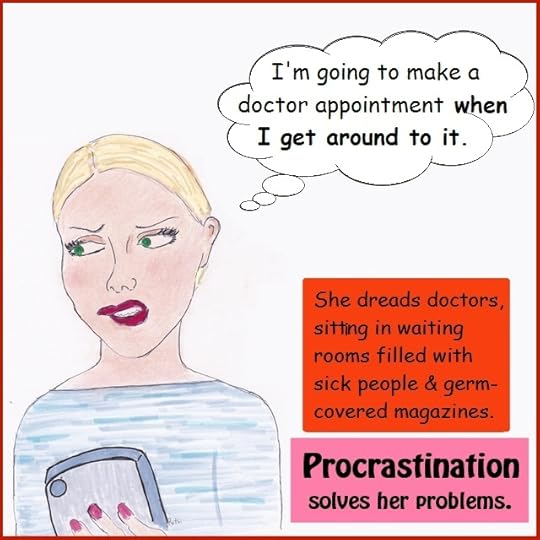
With
my bolstered resolve, I dialed the phone. Her receptionist answered.
“I’m
Ruthi Birch and I’d like to schedule an appointment because I’m having back
pain.”
“Sure.
When do you wanna come?”
“Well,
if she’s available, this Thursday would be good for me.”
“She’s
open pretty much all day. You want 10,11, 1,3?”
“One
o’clock.”
“Okey-dokey.
Bring your ID and insurance information.”
Sensing
she was about to hang up, I asked, “Do you want my name and contact
information?”
“No.
I have your name, Ruby Birch.”
“No,
it’s Ruthi Birch,” I spelled it for her, and gave her my email address to send
a confirmation.
“Okay,
got it.”
I hung
up the phone feeling doubtful. This doctor didn’t seem to have a lot of
patients if she could see me any time, but my back hurt and she was supposed to
be able to fix it, so I rationalized. Maybe she wasn’t busy because it was a
Thursday. Restaurants are slow on Mondays. Maybe Thursdays are slow for
doctors.

On
Thursday morning, I realized I hadn’t gotten an email from the doctor’s office,
so I called just to make sure there was no change, before I’d leave work and drive
forty-five minutes to her office. The same woman answered.
“This
is Ruthi Birch I’m calling to confirm my one o’clock appointment.”
“Sure.
Can you hang on a sec?”
She
didn’t put me on hold, so I could hear her conversation with someone who asked,
“Do you want falafel for lunch. I’m ordering.” She said. “Sure. Let me get my
wallet.”
When
she came back, she asked, “Can you spell your name for me?”
I could spell it, so I
did.
“I
don’t see you on the schedule.”
“I
believe it was you I spoke with on Tuesday and I thought we set the appointment
for today.”
“I
guess it’s my bad,” she said, in such a cute way. “I must
have left it off the schedule, but no problem. You can come anyway. She’s not
busy.”
“I
guess I’d better come. My back is getting worse.”
“Your
back?”
“Yes.”
“Oh,
no. You can’t come for that today.
“Why?”
“You’ll
need an x-ray. We can’t do that today. The machine’s down. We have to
reschedule. When do you want to come?”
“Thanks. I’m not sure. I’ll have to
call back.”

I took two aspirins. I decided to make an appointment with a different doctor – when I got around to it.
The post I’m Going to Procrastinate–When I Get Around to It appeared first on How To Build A Piano Bench.
September 30, 2019
My Mother Doesn’t Want Me to Be on a Committee
A committee was formed to make a plan to increase the company’s market-share.
The chart-maker (there’s always a chart-maker) starts the meeting. “On this chart, you can see the entire market in yellow and our share in green. It shows how much potential business there is for us.”
Next, she puts up a graph with numbers. “This shows you graphically how increased sales equals increased revenue.” The last chart graphs how more salespeople produce more sales.
One member of the committee has been zoned out since the first graph. Then, someone suddenly drops a pen, and she is jolted back to the committee room just as the last chart is being explained. She looks up, focuses, and says, “That’s it then. We need to hire. Are we adjourned?”
The chart-maker gives her a dirty look, and nay-sayer (there’s always one of those too) says, “If we were going to expand, we needed to start this a year ago.”
The list-maker goes to the whiteboard and picks up a marker. “We need a create a profile so we know what we’re looking for. Let’s list the skills and qualifications a candidate needs to be successful.”
That discussion is almost immediately sidetracked into an argument about what’s important and what’s not, criticisms of people hired in the past, and complaints that profiles don’t work.
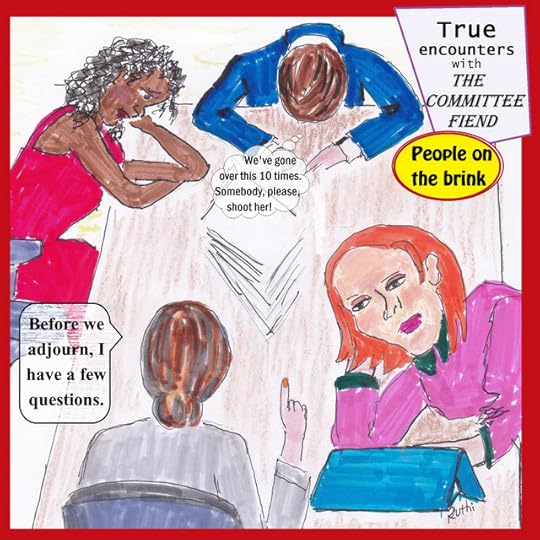
During the discussion, the same member who had zoned out before was back on another planet.
After three hours, the committee adjourns, having defined one action step – hire salespeople.
I went to my first meeting when I was in the third grade – I didn’t like it.
It was a Brownie meeting. I went with my best friend, Sue, a committed Brownie. The girls wore brown dresses and hats, they drank orange Kool-Aid, and ate stale cookies. Then they spent half an hour arguing about which projects they would do, build birdhouses out of Popsicle sticks or make flower-pictures out of pipe cleaners. No consensus was reached.
I didn’t want to make popsicle pipe cleaners. I wanted to go home.
The next week, I tried to run home, but Sue caught me and asked me to go again. I was on the spot and had to think fast, but I came up with the perfect answer:
My mother doesn’t want me to be a Brownie.”
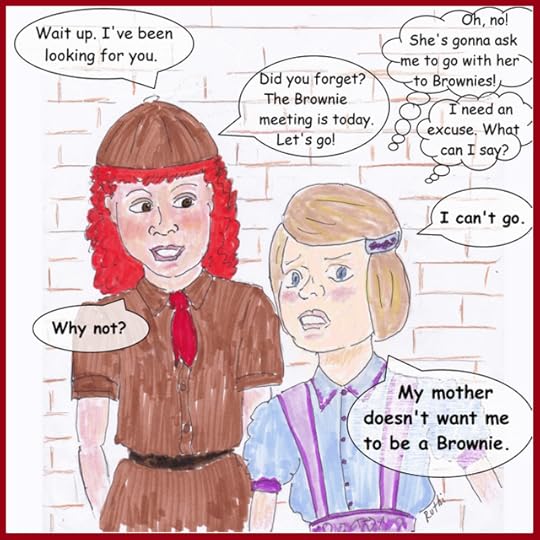
When I grew up, I learned most meetings are pretty much like the Brownie meeting, and just as there are people who want to be Brownies (I admit I didn’t give the organization a fair chance), there are people who want to be on committees. Who are they? How could I spot them, and stay out of meetings with them? I’ve asked myself that question, and noticed at least one indicator. If the person suggests forming a committee or asks to be on one, you’ve probably spotted the person who will talk a topic to death. Then, just as the meeting is wrapping up, this is the person who will ask an already-answered question, then insist the answer needs clarification.
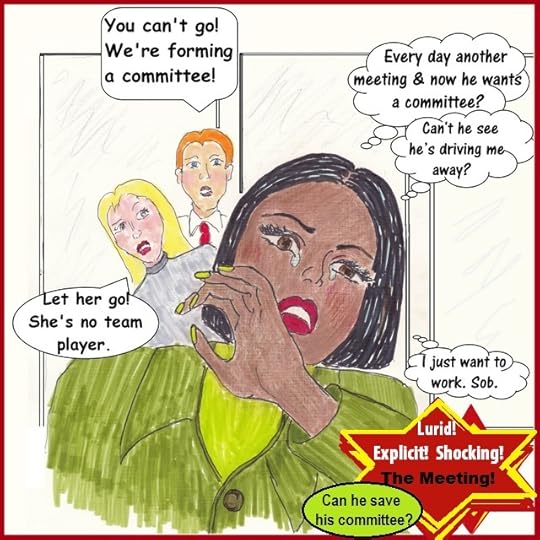
Mr. McKinsey was one of those. He was a math teacher in the school where I taught after college. He found his stage at teachers’ meetings, the educational system’s equivalent to the committee meeting, and possibly a one reason I left for a career in business.
The main topic of one excruciatingly long meeting was the teachers’ lounge. This was the guidance counselor’s pet agenda item. She ranted that some of us (You know who you are!), didn’t have, “the common courtesy to refill the paper in the copy machine, and you leave the teacher’s lounge a mess – so inconsiderate of others!”
That was Mr. McKinsey’s opening, and he was all over it. “I make the motion we set up a committee to draft a rule book for the copy machine and teachers’ lounge etiquette.”
I pictured him spontaneously combusting, and smiled, but quickly checked the smile, lest they think I’m volunteering.
“I don’t belong in teachers’ meetings,” I thought. “It will be different in business.”
I was wrong. It’s a rare committee meeting that gets anything done. The rest wastes time and drains morale. But here’s a solution for you. If you want to avoid having your time wasted and your mind numbed in meetings, just do what I do. Say,
My mother doesn’t want me to be on a committee.”
The post My Mother Doesn’t Want Me to Be on a Committee appeared first on How To Build A Piano Bench.
September 4, 2019
Out of Left Field–Unexpected Things to Hear at the Office
“Out of left field” is an expression taken from baseball. It means something unexpected, odd, or strange. In the office things come from out of left field every day. In the HR department, they sometimes come out every hour.
OUT OF LEFT FIELD: FIRST DAY ON THE
JOB
The employee manual says I don’t get paid time off for the first 90 days. I suppose that means you won’t let me take off even for my aunt’s funeral!
HR MANAGER: Of course you can. When is it? How should I know? She’s not dead yet!
How long do I have to do this job before I can transfer to the marketing department?Can I change my hours? It took me forty-five minutes to get here today and I’m not a morning person.


OUT OF LEFT FIELD: AT THE COFFEE
MACHINE
This weekend I’m starting my
volunteer job. I’m getting to assist the mortician at the funeral home where I
interned during school.
OUT OF LEFT FIELD: ON THE JOB
INTERVIEW
Are you open to suggestions? I see several areas where I can make improvements. I think I can make a big difference here.I was a debutante and am still very active with the debutantes, so I’ll need flexibility to attend meetings and conventions.Do I have to wear shoes to work? I do my best work barefoot.If you hire me, can I get an advance on my salary?What is your drug policy?Is this the only job you have open? I really wanted something more challenging. Are you a Christian?Is it okay if I keep my phone on? I’m expecting a call about another job.



HR
DIRECTOR: Why did you decide to change jobs?
I’ll be honest. You see, men find me attractive… It can cause problems.I have unlimited potential and it’s being hampered by my manager.My boss keeps throwing curve balls. She tells me to get my work done on time, then she criticizes me for making mistakes. She looks for mistakes!I didn’t. They fired me.My daughter is sleeping with my boss. My mother is sleeping with my boss.My boss is never satisfied. I no sooner finish one job, than she expects me to jump right onto another one.



HR
DIRECTOR: Why are you interested in this
position?
Oh, I’m open to anything. I don’t care what I do. I’m not sure I am, but my husband says I have to get a job and earn some money.I sent out a lot of resumes, but you’re the only one who responded.It’s something I know I can do for a while before I pursue my career.Your company’s name is impressive. I think it will look good on my resume.You know when you have children something’s always happening. This is only 15 minutes from my house so I can get there quickly when one of my children need me.


HR DIRECTOR: What are your long-term goals?
My most important goal is to be a dad. Of course, I have to find a wife first. Business or personal?I just want to be happy. To fulfill my potential.

The post Out of Left Field–Unexpected Things to Hear at the Office appeared first on How To Build A Piano Bench.
August 19, 2019
The Sly Old Gander and the Downfall of the Prideful Rooster
“This is a terrible Saturday and Saturdays shouldn’t be terrible,”
said the girl, stomping her foot.
It was a sizzling hot August Saturday, the kind of day only good for swimming. But the Crenshaw children weren’t swimming. They were sitting on the edge of the porch, taking turns throwing rocks at tin cans lined up on the fence.
“It’s not fair. They could take us swimming,” said the girl. “Daddy can look at cattle any day, and Mama could have her sewing circle next week.” She threw a rock so hard it ricocheted off the can and just missed crashing into the windshield of a truck coming up the dusty lane.
When the children saw it was Uncle Gus, bringing Aunt Bessie to the sewing circle, they jumped down and ran to the truck. “Tell us a story. Please. Please. Please,” begged the girl.
The boy moaned, “We’re bored almost to death.”
Aunt Bessie got out, laughing.
Gus wiped his face with a red bandana.
“No. I reckon not. It’s so hot the words would melt before they could get out of my mouth.”
The girl tugged on his arm. “No, they won’t. I’ll give you some cold lemonade.”
Gus climbed down.
“All right, one story, a short one. Get the lemonade.”
They settled in the shade, and Uncle Gus began, “When we left off, the vain rooster, Blue, had set up a ram jumping match, but the wily gander, Hank, fixed it so Maximus would lose, and he’d cheat Blue out of all his corn – again.
Blue was spittin’ mad. He up and flew at Hank, and would’ve slashed the old bird, except Hank was under the protection of the guard-turkeys.
Blue did what a lot of folks do when they can’t win and they can’t fight. He resorted to hateful name-calling.
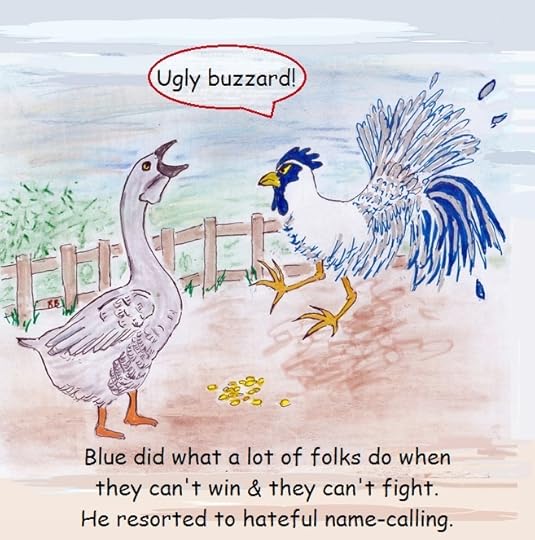
“Hey, Ugly buzzard, the only contest you’d win is one for ugly. Have a beauty contest. I dare you! I’d bet on me, and you’d lose.”

Now, we’ll see how that prideful rooster, with his own cruel words, brought on his worst defeat yet, because just last Saturday, Hank had learned something Blue didn’t know. Here’s a fact – Hank most always knew things nobody else knew. That’s because, where most folks do the talking, Hank hangs back, watches, and does the listening – and he keeps what he learns to himself till he needs it. “You never know when a secret will come in handy.”
Last week, lurking in the shadows, he’d seen a stranger show Farmer Crenshaw something in a crate. When they walked away, Hank snuck around to see what it was. He peeked through a crack, and saw a bird so beautiful, his eyes near popped out. The poor bird was scared, so Hank said sweetly, “Howdy. I’m Hank. Who are you?”
“I’m Sundara-Akbar-Badran.”
“That’s a fine name you’ve got there. I hope you won’t take offense, but what are you?”
He answered, in an odd accent, “I’m a blue peacock. Your farmer might buy me. Is it nice here?”
“Yep. You’ll love it. Tell me, Sundara-Akbar-Badran, where are you from?”
“From India, but I grew up here, so I’m a citizen. Call me Sundara.”
Hank heard the men coming. He said, “Gotta go. Nice meeting you. See you soon, I hope.”
Back in the shadows, he heard the farmer say, “Fine. Bring him two weeks from today.”
So, when Blue dared him to have a beauty contest, Hank knew his secret was going to make him a pile of corn. Words oozed off his beak, “Hmmm. I suppose it’s fair that you get a chance to get even. But, you may not win.”
Blue huffed.
“Okay, then. We’ll do it Saturday?”
Blue agreed, and Hank went to the animals, saying, “I’ve been thinking. We’ve had fighting matches and jumping matches. But we can’t all jump or fight.”
Pearl, the duck, said, “Right.”
“We need a new contest. I see you fine-looking animals, and think, beauty contest.”
Pearl clapped her wings, and some animals said, “Let’s do it.”
Hank trumpeted, “The Crenshaw Farm Beauty Pageant, next Saturday.”
The judges were picked, Esmeralda, the cow, Bacon, an ancient boar, and Montezuma, Mr. Crenshaw’s horse, who was a beauty, but didn’t need acclaim.
“Now. Who’s gonna come on up here and sign up.”
Pearl and her friend, a shy young hen, named Goldie, came forward, then Rose, a spotted pig. Blue strutted in front and crowed, “I’ll sign up.”
Goldie turned to go, but Pearl held her. “Don’t chicken out!”
Blue looked at the sheet, then at Hank, “What’s a Sundara -Akbar-Badran?”
“Oh, didn’t I tell you? He’s a new bird coming on Saturday. I met him through a crack in his crate when the farmers were dealing. He was fretful, coming here a stranger, so I thought we’d make him feel part of things.Worried, Blue?”
Blue crowed.
Goldie tried to run again, but Pearl stepped on her foot. They signed up. Then Butterscotch, a cow, and Jingle, a little horse entered. Hank said, “Anyone else?” To his surprise, Maximus, the ram who’d lost the leaping contest, entered.
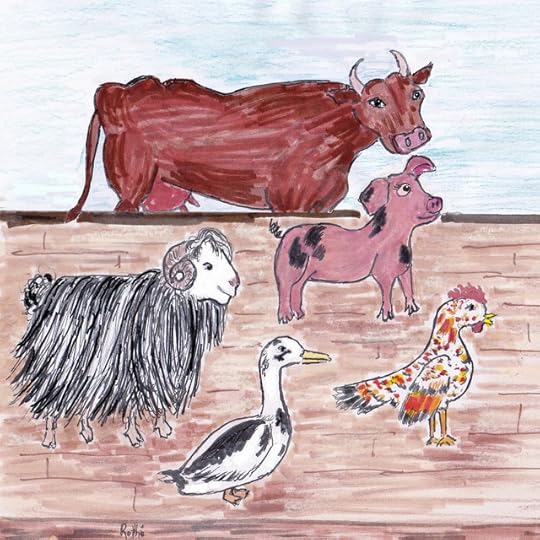
“Okay! Fluff up your feathers or fur and get ready to strut your stuff.”
He tacked the list to the barn door, opened his betting book, and said, “What a fine flock of beauties! Pick your favorites and place your bets.”
Blue bet all his corn on himself. The next five animals bet on him too. Then, Digger, the sheepdog, bet on Butterscotch, and seven ducks bet on Pearl. Soon, there were bets on Goldie, Rose, even Maximus. Blue was too shocked to talk. He just shook his comb, thinking, “They’re throwing away good corn. Makes no sense.”
For the next week, you never saw so much washing, combing, fluffing, puffing as those animals did, except for Maximus. No one saw him all week.
Saturday morning, with the farm buzzing, Hank quit taking bets, and took off to meet Sundara.
Once freed from the crate, the bird stretched and spread his feathers. “I won!” thought Hank, as he put a wing around him to whisk him into the trees. “Friend Sunny, I have a surprise. To welcome you big, I entered you in our farm beauty pageant! We have some mighty fine-looking animals here, so you probably won’t win, but that’s not what matters.”
Sundara agreed it didn’t matter.
“We’re happy to have you with us.”
Sundara said, “Hank, you’re so kind. Thank you.”
Hank waved a wing. “Not necessary. It warmed my heart to do it. Now you rest here in the shade. I’ll get you when it’s time.”
With that, Hank rushed back to start the pageant. He told the contestants, “Walk to the middle of the stage, stop, turn, pose, and turn again, then walk off the other side. Then, you’ll parade across together. Got it?”
They nodded.
“Okay. Goldie, go first.”
Goldie’s head popped up. “Me?”
“Yes. Then, Rose, Pearl, Butterscotch, Jingle, and Maximus, then Blue and Sundara.”
Suddenly, Hank looked around and barked, “Wait! Where’s Maximus?”
“I’m here,” said a voice, and from behind Jingle, stepped a dazzling ram.
Hank’s beak dropped open. “Max?”
“Yes.”
“Where’ve you been?”
“I combed out my wool. It took all week.”
Pearl cried, “You’re gorgeous!” Goldie whispered, “You’re gonna win.”
Blue scoffed. “Looking better, Max, but don’t get your hopes up.”
Hank looked out. The judges were in place, and all the animals, even Rocko, the scary cat that lived under the farmhouse, were there.
“Ready, Goldie? Go.”
One by one, they walked onstage, to whinnies, bleats, and chirps. But when Maximus went on, there was not a peep. I tell you, poor Max turned red with shame, standing there in the silence. He was about to run away, when the animals went wild, cheering, screaming, whistling, and calling, “You’re gorgeous!”
“Me?” He couldn’t believe it.
While Max was enjoying the glory, Hank left to fetch Sundara. “Ready?”
Sundara nodded.
They came up as Blue was onstage.

Sundara heard such loud cheers, he peeked in, and was stunned by Blue’s beauty. Hank pushed him, saying, “Go out there and spread your feathers.”
Then, Hank called for his guard-turkeys.
Sundara walked out, with a shy smile.

The crowd cheered, “Welcome.” Then, he spread his feathers, and every animal gasped, then cheered, even louder than they had for Blue. Blue came from behind the stage to see what the commotion was about.
When he saw Sundara, he ran, screeching, feathers flying, to lay into Hank, but Hank’s guard-turkeys were there. Blue pulled in his talons, but hissed, “Ugly crook!” If the look on his face could have killed, Hank would have dropped right there.
Hank smiled. “Blue, what’s stuck in your craw? This is your contest. Smile. It’s time for the big promenade and to learn who wins. “
Hank walked onstage. “Let’s give a big hand for all of our beauties.
As they paraded and lined up, the judges leaned together, with much whispering and shaking of heads. Onstage, the animals tried to smile and keep calm, but that’s right hard to do while you’re holding your breath and crossing your feathers.
Finally, they looked up. Esmeralda said, “It was close, but we have a winner.”
Bacon sermonized,
“The wise animals of ancient days gave us these words, ‘Beauty is the quiet sound of a dear one’s breath, the caress of a nose or beak…’”
Montezuma reared up. “Enough speechifying. Maximus won!”

The animals, except Blue, clapped, pawed, or flapped, yelling, “Maximus. Maximus.” But he just stood there, sure the winner couldn’t be him. Goldie pecked him. “Maximus, it’s you,” she clucked. “You won!”

The dazed ram trotted to the front, his sleek wool flowing in silky waves. As they showered him with wild violets, daisies, and yellow goatsbeard, he beamed.

Poor Blue Tommie Joe! He felt lower than a hound on this August day. He slumped behind the stage grieving for his lost title, and worse, that he’d never get it back – not because of Maximus. Blue knew he was a temporary champion. He loved leaping over rocks too much to stay beautified.
A new rival was the cause for his agony. He’d known it the second he stood beak-to-beak with the peacock, thinking, “It’s over. I might as well go back to fighting.” Right then Sundara skittered up, and plopped himself right next to Blue, babbling, “You’re so, so, uh, majestic. We’ll be best friends.”

Blue looked sideways at the blathering bird, and shook his head. Then he got up, and with head hanging and blue wings dragging in the dust, he walked past Hank and his pile of corn. He kept walking, with the peacock trotting after him like a puppy dog.”
“The end,” said Uncle Gus, and winked, “Too bad there are no children here who would want to go swimming.”
“We do,” they screamed, ran to grab their suits, and jumped in the truck.
The post The Sly Old Gander and the Downfall of the Prideful Rooster appeared first on How To Build A Piano Bench.
August 6, 2019
The Wily Gander & the Vain Rooster-Another Barnyard Tale
Uncle Gus was the best story teller in all the county. When the children saw him coming, they ran to meet him. The boy said, “Tell us a story, please.”
The girl giggled and said,
“Yes. Tell us another story about Blue Tommie Joe and the animals on the Crenshaw farm.”
She grabbed his arm, the boy grabbed the other, and they pulled him to the porch swing.
Uncle Gus, sighed. “I reckon, you caught me fair and square. Sit down and I’ll see what I can do.” The girl sat on the swing beside him. The boy lay with his back on the floor and his arms folded under his head.
Uncle Gus scratched his chin and said, “As I remember, I told you about the night Blue Tommie Joe killed Cock Ruby-Eyes in a fight set up by that old sly old gander, Hank.”
They nodded, and the girl clapped her hands.
“Yep. Old Hank made a fat stack of corn off the bets on that fight. Blue Tommie Joe won the fight, but he was mighty beat up, with an eye swollen shut, talons broken, and one wing dangling, nearly useless. When he saw Hank with that big pile of corn he’d won, bloodied Blue Tommie limped over and said, “I’m here for my share.”
Old Hank looked at Blue out of the corner of his eye. “What are you talking about, Boy? I don’t recall you laying any bet.” He made a show of studying his bet book, saying, “But let me look. No, I don’t see as you ever placed a bet.” He grinned, and added, “You surely should have, because you fought a fine fight.”
“I nearly got killed, fighting the fight you set up. You owe me. Pay up!”
Sly Hank smiled, and asked, “Your share? I never promised you a share, but if you have a contract, I’ll sure enough honor it. I sure will – just as soon as you bring it to me.”

Blue was fit to be tied. “I won the fight, but don’t get anything to show for it?”
“Sure you do,” said Hank. “You get to be the champ.”
“You crooked old gander. If I wasn’t so broken up, I’d beat the smile off your face, beat you till you’d be fit for nothing but the Crenshaw’s supper table.” Blue drug himself off, saying, “I’ll get even with you!”
Over time, Blue’s wounds healed, and Hank’s ill-gotten gains ran out.
One morning, Blue was perched on the water through, admiring his beautiful blue feathers reflected in the water. Esmeralda, the wise old cow, came up to drink and said “Blue, stop your preening and move over.” He flew up to the fence where he saw Hank edging around the barn.

Blue said, “Esmeralda, look at Hank, sneaking around, looking for his next dirty deal. He cheated me, but someday I’ll get even.”
Esmeralda rolled her eyes. “Don’t try it. You’ll get taken again. He’s too wily.”
“There’s more to Blue Tommie Joe than beauty and brawn – I’ve got brains. I’ll show you all. I’ll set up my own match and win more corn than Hank’s ever did.”
“What kind of match?”
“Can’t be a fight,” he said, stretching his neck up and spreading his blue wings. “There’s not a rooster on the farm who’ll fight me, but I’ll think of something.”
Blue started thinking of ideas. He walked by the sty, and thought, “Hmmm. Maybe a pig-in-mud fight.” Then he pictured it, and thought, “Nah, pigs rolling in mud? They’d be too happy to fight.”
Bones, the barn cat, walked by, and Blue thought about a cat-fight between Rocko, the old tom cat that stayed under Farmer Crenshaw’s porch, and Bones. Then he remembered the day he’d come beak to face with Rocko. No, not again!

A day went past, then another, and another, and still no idea. “Do I have better’s block?” he thought, then told himself, “No! I just have to think harder.”
He was thinking so hard he didn’t see how close he was to the water, until a big splash soaked his beautiful blue feathers with muddy water.
He was cussin’ mad, stomping around, throwing a fit, and yelling, “Who did that?” Then he saw the frogs splashing and jumping from rock to rock, and he had his idea. He crowed,
“That’s it! But not leapfrog! Leap-sheep!” The champion leaper was Dexter. But Blue had seen the young ram, Maximus, sneaking off to practice, and followed him, spying. “Yes sir,” he thought, “Maximus can win.”
Blue raced back to the barnyard, crowing at the top of his voice, and with muddy water flying off his feathers. That bird was a sight. Esmeralda laughed. But the hens were scared. They stopped their pecking, and scattered, clucking, “What’s he running from? It must be Rocko. Is it Rocko? Is he coming?”

Blue ran on past them, to the sheep pasture gate, where he stopped, took a breath. Then he strolled in like it was Sunday. He ambled up to Maximus. “Howdy, Max. Nice running into you. I’ve been hearing some mighty nice things about you.”
Maximus hated that nickname, but he had to ask, “What did you hear?”
“Just that you’re a pretty good jumper, maybe better than Dexter.”
That’s just what the ram wanted, but he didn’t let on. “Jumping just comes naturally to me. I never give a thought to who’s best – and don’t call me Max. “
Blue said. “Sure thing, Max. You don’t care about competing to see who’s best, so we’ll never know if you could be the champ.”
Maximus said, “Huh? I didn’t say I wouldn’t compete with him. I might.”
Blue saw some young ewes watching, and said
“Look, they’re watching you. Take a few jumps. Show off for them. But, if I was you, I’d hold back, not let Dexter know how good I was.”
The ram took off, leaping, but not as high as he could.
Blue leaned against the fence, flicking mud off his feathers, waiting. When Dexter came around the corner, he sidled up to him, and crooned, “Dexter, How do you do it? You look fitter and friskier all the time.”
Dexter backed away from the muddy bird, with a look of disgust. He didn’t much like Blue or his bragging and crowing.
Blue kept smiling. “I was chatting with Esmeralda the other day and we were wondering. Dexter, didn’t you used to be the best jumper in the pasture?”
The ram snorted.
“I’m still the best jumper in the pasture.”
Blue scratched his comb. “Think so? They say young Maximus is as good – maybe even better than you were in your prime.”
Dexter snorted and pawed the ground. “In my prime? In my prime?! I’ll show them prime!” and he exploded into a run, jumping and snorting. With the seeds of jealousy sown, Blue strutted off, leaving them to grow.
Blue dropped hints. “Have you seen those two rams jumping, trying to out-do each other? That young’un’s good, I’d put my money on Dexter.”
Pretty soon, the animals were hankering for a contest, so he went to Dexter and Maximus. He set the match for noon on Saturday, and started taking bets.
The animals placed bets till Blue’s bet book was about full. Then the ducks came in and placed the biggest bet of all, which was odd, because the ducks were known to be stingy with their corn. He was happy to take their money, because he knew Max was the best and he was going to make a killing.
Blue said to Esmeralda, “Old Hank’s not been around – mad he didn’t come up with the idea first.”
Saturday noon, the animals gathered in the pasture, except for Hank. Blue wanted to see the old gander’s face when Max won and he got rich.
Just as Blue signaled the contest to start, the old gander strutted in, smiling as big as you please,
The rams took off, jumping around like rabbits, but Maximus was at full throttle, taking three leaps for every one Dexter took. One jump, two jumps, five jumps, ten. Hootin’ and hollerin’ rang through the pasture.

At the break Max was seven leaps ahead. Blue looked around, hoping to see Hank’s face, but he’d lost sight of him again.
When the match started again, Dexter, who had paced himself, while Max ran full-steam, was going strong. Twelve jumps, fifteen, eighteen.
But Max’s leaps were getting shorter and lower till he was more hopping than jumping. The crowd roared, when Dexter caught up, then screamed, “Dexter’s ahead!” Maximus gathered up all his strength, crouched, pushed off, but didn’t jump an inch. He fell and lay on the ground, while the animals cheered for Dexter. “Champ! Champ.”
Maximus sat on the grass rubbing his hoof. Hank came by and said, “Tough break, Max. Maybe next year.”
The ram groaned, “I wish Farmer Crenshaw would sell me to another farmer.” Just then, a jagged piece of glass popped out of his hoof, and he yelled, “It wasn’t fair. I had glass in my hoof.”
Hank patted his shoulder. “Tough break, Max. I can’t imagine how broken glass got in the pasture.”
Poor Blue Tommy, was in the barnyard, settling bets, till he had just a tiny pile of corn. Two turkeys Blue didn’t know were coming his way. Then, he saw Hank was with them, and grinning big as daylight. Hank pulled out a burlap sack and dumped out all the ducks’ betting tickets.
“I’ve come to collect our winnings.”
Hank had beat him again! Blue went crazy. He leapt at Hank with his claws out, aiming for the gander’s throat to tear it open, but the turkeys stepped up and spread their wings in front of him.
Blue’s claws caught in the wings, and the birds shook him off to sprawl in the dust. “You owe me a pile more than what you have here. You’ll be months paying me off, but take a lesson, Blue, my boy. Don’t bet against me. You can’t trick a trickster.”

With that, Hank swept what corn was left into his sack and turned to walk away. Blue stood up and brushed off his feathers, taking back his pride. “You’re the best cheater, but that’s nothing, you ugly old buzzard. The only contest you’d win without cheating is an ugly contest. You wouldn’t dare have a beauty contest. I’d bet on myself, and you’d see who’d walk away with the prize.”

A sly smile came on Hank’s face. In his sneaking around, he’d heard Farmer Crenshaw talking, and he knew something Blue didn’t know.
“A beauty contest, you say. Why, Blue, that’s a fine idea. I’ll set it up for one week from today.”
“And that’s the end of the story,” said Uncle Gus, standing up.
“No,” screamed the girl. The boy begged, “Tell us. What did Hank know?”
“No, I’ve got chores to do. That’s a story for another day.”
The post The Wily Gander & the Vain Rooster-Another Barnyard Tale appeared first on How To Build A Piano Bench.
July 16, 2019
The Cavewoman Who Stopped Gathering & Brought Home the Bison
Two mistakes were made that day.
If I had read the brochure, I’d never have let my friend drag me into that lecture.
If the speaker had read my expression, she’d never have called on me for my opinion.
But I didn’t read the brochure, so I was stuck, sitting in the middle of the front row, when the lecturer proclaimed,
“Men and women are different psychologically.”
I silently moaned and openly rolled my eyes. She was rehashing the old cliché, “Men are hunters. Women are gatherers. Men – heroes. Women – damsels.”
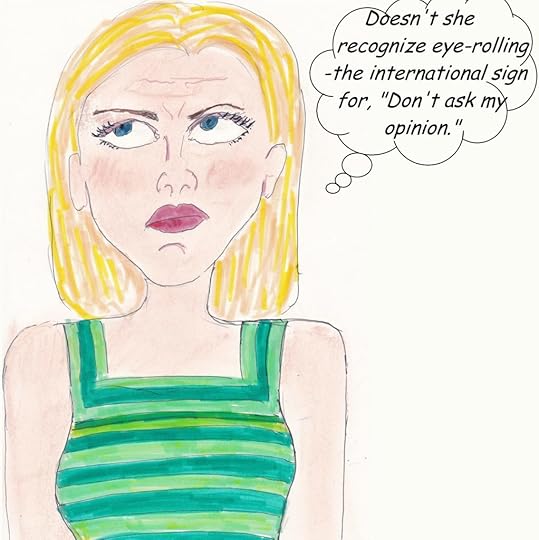
She had examples. “Men read maps. Women ask for directions,” she said and I wondered, “Does this mean I’m a man?”
She trotted out the old caveman/cavewoman story as proof of her hunter/gatherer theory that it’s only natural for men to value competence and accomplishments, and for women to value feelings and nurturing.
To pass the time until I could leave, I imagined the first cavewoman who got fed up with gathering and nurturing, grabbed a club, and waved goodbye as she marched off to bring home the bison. That first heroic woman, dressed in bearskins, her hair, tangled and wild, defied custom, ignored danger, overcame obstacles, to go out and do extraordinary things. That woman was awesome, and she has millions of awesome descendants.

Suddenly, I realized the lecturer had left the podium, was standing directly in front of me, and saying, “I’d like to hear your thoughts.”
She couldn’t mean me! Did she think eye-rolling and head-shaking were signs of appreciation and support?
I said, “No. You really wouldn’t.”
“Yes, I would. Don’t be shy.”
I sighed.
Okay. I think your premise is one of the stupidest things I’ve ever heard. Those traits, courage, competence, pride, and feelings are neither masculine nor feminine. I grew up with competent women, heroic women. My mother for one. When she saw that workers in grocery stores were not being paid fair wages, she didn’t wait for a knight to come forth and save the day. She researched unions, sought out the organizers for retail clerks, and worked with them to unionize the stores in Mobile, Alabama.”
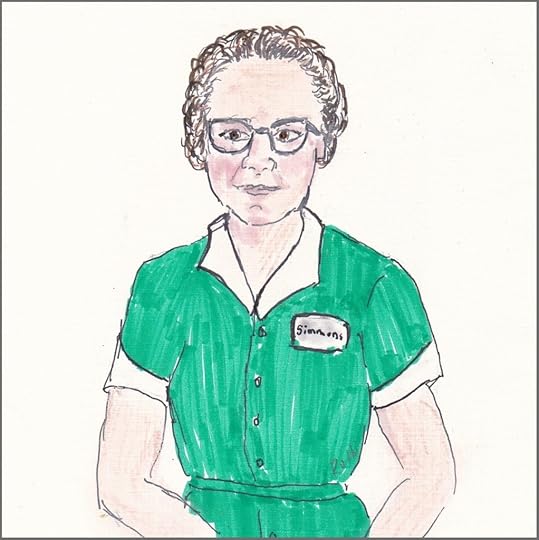
The woman smiled indulgently. “That was true for your mother, but not for most women. Psychologically, men are still hunters and women still gatherers and nurturers, looking for a knight in shining armor.”
Was she kidding? It was true not just for my mother. My grandmother was on her own, with no skills or money, but she didn’t look for a man to take care of her. She apprenticed herself to a seamstress, then built her own business, making gowns for the wealthiest women in California. My cousin, when she was a grandmother, went to work for FEMA and received accolades from governors for her management of disaster areas.
I knew there were millions of women who disproved the cavewoman theory, and I tried to think of other examples, but after Eleanor Roosevelt and Madam Curie, I was stumped. It was embarrassing, but it set me off on a search to learn about awe-inspiring, heroic women. I discovered them in all ages and in every country, enough heroic women to fill the world with inspiration – women such as, Moving Robe Woman, a warrior who fought at the Little Bighorn, Ching Shih, a pirate queen, and Hypatia the world’s leading mathematician and astronomer in the third century, BC.

In the 20th century, Wangari Maathai (Kenya) was an environmental and human rights activist, who founded the Green Belt Movement, an organization that still works to conserve the environment, reduce poverty, promote gender equality, enhance gender relations, and involve women in decision-making processes.
“Cease to be a drudge, seek to be an artist,” said Mary McLeod Bethune, businesswoman, business founder, educator, college founder, and co-founder of the United Negro college Fund. She was an outspoken crusader for racial and gender equality. When she was on the advisory board that created the Women’s Army Corps, she insisted that it was racially integrated. Mrs. Bethune’s statue, in Lincoln Park in Washington D.C., was the first to honor an African American woman.

The lecture I didn’t want to attend opened my eyes to the heroic women who worked or fought to get out of the cave, and gave the world so much. Now, I get to share them as I celebrate their birthdays on social media.
The post The Cavewoman Who Stopped Gathering & Brought Home the Bison appeared first on How To Build A Piano Bench.
June 26, 2019
Clueless College Grad Learns a Lesson: Women Earn Less Than Men
It was the 70s. Things were different then.
I was a college graduate, and I was learning a lot about the job market as I was trying to get my start in the world of business. For example, on my very first interview, I learned my college degree didn’t matter. My GPA didn’t matter. All those semesters I’d worked so hard to be on the Dean’s List didn’t matter. All that mattered was my typing skills. I learned that there were some jobs that didn’t require typing – but they were only for men.
The lady at the staffing firm said she would call if there was a job for me. I waited. She didn’t call. I called on ads for management trainee jobs, but all they wanted to know was, “How fast do you type?”
Finally, the phone rang. It was the lady from the staffing firm and she was chirpy. “I have a job for you! Mr. Adams, the manager of an upscale gift and stationary store is looking for a manager trainee. I told him about you and he wants to meet you today.”
“And I don’t have to type?”
She laughed sweetly. “No typing. I told him how pretty and stylish you are.”
“Did you tell him that I have a liberal arts degree and also studied art?”
“Yes. His customers are professional business people, and he needs a person who’s polished, one they can relate to.”
“It’s retail? A cashier job?” I asked, remembering the two days I’d worked in a grocery store during high school, and had lines backed up to the meat department because I couldn’t catch on to the cash register. “But I really don’t want a job in retail.”

“Yes, but, Sweetie, there’s just not much else for you unless you learn to type.”
(I had already borrowed a typewriter and tried to learn. I lacked both eye-hand coordination and patience, so I’d type five words and make an error. In case you’ve never seen one, I can tell you typewriters are mean, unforgiving machines. One mistake and you had to start all over – just like the cash register.)
“Anyway, this is more than ringing up purchases. You’ll get to use your creativity and arrange the gift displays.”
“Aren’t there any manager trainee jobs in offices?”
“Yes, but they are all looking to hire men.”
“The fee? Will the company pay it?”
“No, you’ll have to pay the fee.”
I sighed and said okay. She told me an address. It was on the 4000 block of Massachusetts Avenue.
First I had to find the place (there was no SIRI then). I’d only been in the area for two weeks, living in Maryland, but luckily, I knew where Massachusetts Avenue was. It was in downtown Washington. I took 16th Street to K Street, Connecticut Avenue to DuPont Circle, went around it, and got off on Massachusetts, which I took all the way back to Maryland. I made a twenty-minute drive just over an hour. Not bad.
I went in, doubtful, but it was nicer than a grocery store, and Mr. Adams was nice to me. He even asked about my degree. I started feeling a little better. I would be responsible for arranging the displays, and helping customers choose the right stationary and gifts. After about thirty minutes, he surprised me by offering me the job. But I still didn’t want retail – until he told me my salary. I’d earn one hundred and thirty-five dollars a week (that equates to over forty-six thousand dollars a year today). Wow! I accepted.
Mr. Adams gave me my application and told me to take it to the company’s human resources manager to finish my paperwork. I would start Monday.
The human resources department was in the back of a basement in their main store. I walked through dark and dusty rows of racks filled with boxes. It was creepy, but I was up because I had a job and a great salary.
There was no door on the office, so I could see a woman standing at a file cabinet. She was tall with a square build and the biggest shoulders I’d ever seen on a woman. Her heavy brown suit looked almost military, but without any medals or ribbons. She was scary.
I thought she must have heard me coming, but she didn’t look up, so I knocked on the wall. She turned and glared at me as if she wanted to eat me alive, but I didn’t run away. I handed her my application, which she tossed onto her cluttered desk without looking at it. She spoke in a clipped voice that completed the military image.
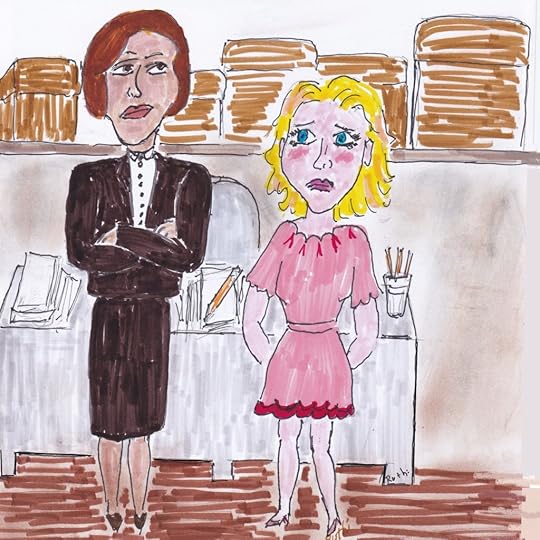
“Mr. Adams said he thinks I should hire you. Have you ever worked in an office supply store before?”
“No.” I almost said, “No, Ma’am.”
“Have you even worked in retail?”
“No.” (I decided she didn’t mean the two days in the grocery store.) “Well,” she said, “why should I hire you?”
“Mr. Adams already hired me. He told me to start Monday.”
“Then I suppose there’s nothing for me to do, is there?” she snarled. “Fine. You start Monday at one hundred dollars a week.”
“I thought I’d make a hundred thirty-five.”
“No you won’t. You’ll make one hundred! If you were a man, you would get one thirty-five.”
“Is this the same job? The manager trainee?”
“That’s the job.”
“May I ask you a question? Why won’t I make one thirty-five?”
She enunciated her words as though explaining a problem to a child, a dumb child. “Because you are a woman!”
“Why does a woman make less?”
She rolled her eyes. “Because men should make more. Men support families. Besides that, a woman has other issues to consider. Look at it this way. What if you are in the storeroom and a box falls off and hits you in the chest?”
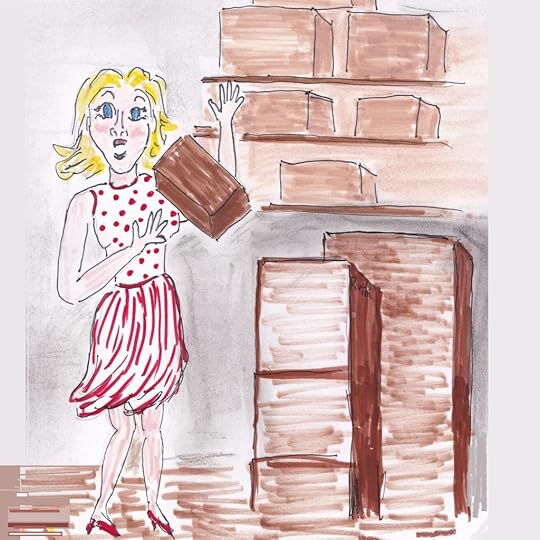
I left without a job, but I had learned another lesson. Men were paid more money than women, because they were men.
Sadly, women are still learning that lesson today.
The post Clueless College Grad Learns a Lesson: Women Earn Less Than Men appeared first on How To Build A Piano Bench.
June 13, 2019
Clueless College Grad’s 1st Interview in the Business World
“I have a college degree,” I said.
And she said, “That’s nice. What can you do?”
It was my first grownup, post-college job interview in the business world. Here’s how it went.
I was ready to launch my career in business. I’d never worked in an office before, but I knew that’s where the jobs were, so I made an appointment with a staffing company.
The day of my interview, I got dressed in my new pink dress with red cuffs, and matching red shoes and purse. It was the perfect outfit, and my hair looked great. I was ready.
I stood at the door of the office for a minute to gathered my courage, and went in. A nice woman at the front desk handed me my very first job application. I took it and wrote down the name of the middle school where I’d taught for two years. (I’d been hired over the phone without an interview.)

I wrote down the two departments at the University of Georgia where I worked throughout college. I didn’t think she needed to know about my two-day career as a cashier in a grocery store.
“Let me explain. I was not cut out for the high-pressure work of cashiering. When you don’t hit all the right buttons on the cash register, you have to start over. And it takes a lot of time when you have to do a whole cart-full of groceries over. And I was supposed to remember the prices for beans, and carrots, and parsnips, all at the same time. It was hard to remember anything when the line of customers was getting longer and longer. And I didn’t even know what a parsnip was.”

I finished the application lickety-split (I hoped my quickness would impress her), and gave it back to the woman. She buzzed someone on the phone, and another woman came out and took my application, and me, to a room with a desk and two chairs.
As she read through my application, she made what I took to be little encouraging comments.
“Hmmm, okay. Good.”
She tapped her pen on the application.
“I see here you were a teacher for two years. How fast do you type?” *
“Yes. Uh…I don’t type,” I said.
“Didn’t you have to type your papers in college?”
“No. I paid another student to type them.”
“Did you ever work in an office at all?”
“No,” I answered.
“What were your jobs during school?”
“My first year I worked in the audio-visual department of the school of education. It was in a classroom,” I answered, relieved to say I did something.
“What did you do?”
“I taught students to use the film projector, change film, and splice film. The next year, I changed to work in the file room of the dean’s office. I filed forms.”
“Hmmm,” she said again. “The A-V department sounds more interesting than filing. Why did you change?”
“The films we used for training were World War II training films. The army made them for paraplegics, quadriplegics, and amputees to teach them how to use prosthetic arms and legs, and to show how many things they could do without arms or legs. After I watched them for a while, I preferred filing,” I explained. Then I added, “I wasn’t very good with the mechanics of the projectors anyway.”
“Uh huh,” she said and wrote something on my application. “And in the dean’s office, you never, ever typed anything?”
“They let me type names of books on index cards, but I had trouble loading the cards into the typewriter. But she said they didn’t have to be perfect.”
“I see. Did you answer phones?” I sensed she was on my side and trying to find some usable experience.
“Once I think I did. No, twice, and I took a message!” I said, brightly.
“Numbers?”
“No.”
“Anything else?”
“Yes! I almost forgot. I collated too.”

“Okay, then. Let’s see what we have for you.”
She opened a five-by-eight file box and thumbed through it. She pulled out a card. In spite of my lack of qualifications, she had an interview for me.
“But,” she said, “first, you need to sign this agreement that you will pay the fee if I place you in a job.”
“I thought the employers paid the fees.” (I’m sure she was thinking I’d be lucky if some employer let me buy a job.)
“Many of them do, but you can’t type and you really don’t have any experience. There aren’t as many jobs for you. Go ahead and go on the interview. You don’t have to take the job if you don’t want to. Sign this, in case you decide you do want it.”
“But what about the ad you posted for a college graduate?” I asked. “It said no experience and the fee was paid.”
“Oh, I’m sorry for the confusion. That job is for a man.“
I signed.
“Go to the third floor of the Bryant store at 1420 F Street and see Mrs. Jones. She said she is willing to train and she doesn’t need you to type.”
I found the Bryant store between two boarded up buildings. It looked scary, but I went in. A gigantic elevator took me to the third floor. The whole floor was one big room with dusty wood floors and a wall of filing cabinets.
Mrs. Jones sat at a metal table under a single lightbulb that hung from the ceiling. She had a pencil pushed through her bun and another one in her teeth, and she was clanking away at a calculator, with its tape flowing into a paper pool on the floor. She saw me, took the pencil out of her mouth, and dropped it.

“You’re from the agency? For the interview? She sent you? This is a record-keeping job.”
“Yes, ma’am.”
“Do you have any experience?”
“I worked in college and taught middle school.”
“This would be your desk,” she said, and my eyes got big.
I didn’t say anything but I smiled and nodded. She looked me over, from my new interview suit to my cute shoes and matching purse.
“I’m going to do you a favor, Hun. I’m going to let you leave.”
So, I left, and returned to the lady at the agency to learn what else the world had in store for a non-typing ex-schoolteacher.
*At that time, there was a typewriter on every desk instead of a computer.
Read my next post about my second interview experience where I learned why men should be paid more than women.
The post Clueless College Grad’s 1st Interview in the Business World appeared first on How To Build A Piano Bench.
May 21, 2019
One Last Fight for the Old Barnyard Champ
When the Crenshaw children saw Uncle Gus sitting alone on the swing, they came around and begged for a story. His voice sounded like crunching gravel. It was made for telling stories.
“Alright, you’ve been fairly good today, so I suppose you deserve a story. Let’s see… How about the time that old roster, Cock Ruby-Eyes fought Blue Tommy Joe?”
The little girl squealed, “Yes!” The boy dropped to the floor, propping his head on his fists, ready.
“You remember that old bird, Cock Ruby-Eyes?” The children nodded, yes. “Well then, you know he had been the barnyard champ for as many years as anyone could remember. Then one day, Farmer WB Crenshaw…” The girl giggled.
“Harrumph! As I was saying, Farmer Crenshaw came home with this young rooster by the name of Blue Tommy Joe. With a bright blue comb and tail feathers, he was as pretty a bird as anybody on the farm had ever seen. Yep. Blue Tommy sure was a fine bird, with long talons and a wing spread four times the width of his body. He was a proud bird too – cocky, so to speak.” The girl giggled again, which brought a mock stern look from her uncle.

“Well, this youngster starts bragging around the barnyard that he can bring that old warrior, Cock Ruby-Eyes, down in three rounds.
Now, as it happened, a sly old gander named Hank was lurking behind a tree, listening to that brash young bird brag. He saw a chance to make himself a whole pile of corn, and he set out with a plan to do just that.
First, Hank went to Cock Ruby-Eyes and told him the youngster was bragging that he could beat Ruby with one wing tied behind him. That made the old bird fightin’ mad.

“I came to tell you,” said wily Hank, “because I don’t like some fancy dude of a bird coming in here and insulting our champ. He needs to be taught who’s the head rooster on this farm.”
Then, Hank went to Blue, and told him, “Ruby said you’re a blueberry creampuff who couldn’t beat a hen.”
The fight was set for the next Saturday. Blue Tommy went into training right then and there, so determined to be the new king of the farm. The animals who saw him working out said he was a sure win, but Cock Ruby had his supporters too.

Cock Ruby knew it might be true that he was getting too old to beat Blue, but that bird’s bragging had gotten under his feathers. “I might be ready to lay down my title, but it won’t be to this pretty-boy newcomer,” said Ruby. He was a crafty old fighter, and not above cheating.
Come Saturday, every animal down to the last duckling, chick, and calf was in the barn. Hank stood at the barn door, taking bets till the big event was about to start.

Cock Ruby-Eyes strutted in with a mean glint in his eyes and a smile on his beak. He was cheatin’ ready, with a knife blade strapped underneath his wing. He had it hidden so well, even an eagle, with perfect eyesight, would have to be looking from just the right angle to spot it.
Blue Tommy Joe danced in, not a bit scared. He came crowing, laughing, waving his wings, and nodding his pretty blue comb at the hens, who cheered and waved.
The fight started. Blue moved in fast, dancing around, playing with the old rooster, mocking him with playful swings. Ruby stayed back against the ropes, alert and biding his time. “Let the boy tire himself out,” thought Cock Ruby, as he dodged Blue’s jabs and thrusts. The animals were booing and yelling at Ruby to get in there and fight, but he stayed back, and ended the first round without much damage.
In the second round, Blue started dancing again. Then, all of a sudden, he moved in, and caught Ruby with a staggering blow. The old rooster slumped and looked as if he wouldn’t be make it through the round. But Old Ruby pulled himself up, and kept coming back, hit after hit, round after round. The fight went on into the night.
Then, in the sixth round, Ruby came alive. He moved so fast nobody could tell who struck the blow. There was a flash. Swing! Swat! And Blue Tommy was down. Tommy Blue was bleeding. He jumped back up, looking confused. He couldn’t see what was doing it, but every time he got near Ruby, he felt his flesh slice open – first his breast, then his leg. Pretty soon that spry young rooster was sagging. Then, with a fierce swing, Ruby sliced a red gash into the back of Blue’s neck. Blue staggered and fell on the barn floor, looking worn out and ready for nothing more than the skillet.
But Blue wasn’t ready to be fried just yet. He pulled himself up, bloody as he was, to stand and face what might have been Cock Ruby’s finishing thrust. But the old champ was strutting around the ring and showing off, too drunk on winning to see that Blue was up. It gave Blue time to catch his second wind and come back at Ruby. That’s just what he did, all right, he came at Ruby with a vengeance. Feathers flew all over the barn. It was a sight.
Ruby tottered, but he rallied, and went after Blue again. Swoosh! Slash! Slice! And Blue slumped to his knees, his left wing dangling, useless at his side.
Ruby knew he was just a swing away from keeping his title as the number one bird in the barnyard. He came on hard and fast, flapping his wing with the knife blade on it. Then, just as he was nearing Blue’s throat, the knife blade came loose, and flew across the ring. When the animals saw it, they mooed, and hooted, and booed Ruby, but he paid ‘em no mind. He ran for the knife, but Blue saw it too, and was on him, pecking and clawing. Ruby knocked Blue off, and grabbed the knife. The animals hissed and screeched.
Blue Tommy was done for and everyone knew it. Cock Ruby came for him, knife first, but the floor was slick with blood. He slipped. He swayed back and forth, then fell to the ground with a thud, never to get up again. Old Cock Ruby-Eyes, champion of the barnyard, was dead. The knife, meant to kill Tommy, was stuck in his heart.
The animals cheered, and picked up Blue Tommy Joe, the new Champion, and carried the exhausted and aching bird out of the barn to parade under the stars. They all joined in the merriment, except for that old gander, Hank. He hung back in the barn, counting his corn.”

The story came to an abrupt end when Aunt Bessie came out on the porch, and with a twinkle in her eyes, said, “And Farmer Crenshaw and his family had a tough old chicken for Sunday dinner. Now it’s time for bed.”
The post One Last Fight for the Old Barnyard Champ appeared first on How To Build A Piano Bench.



